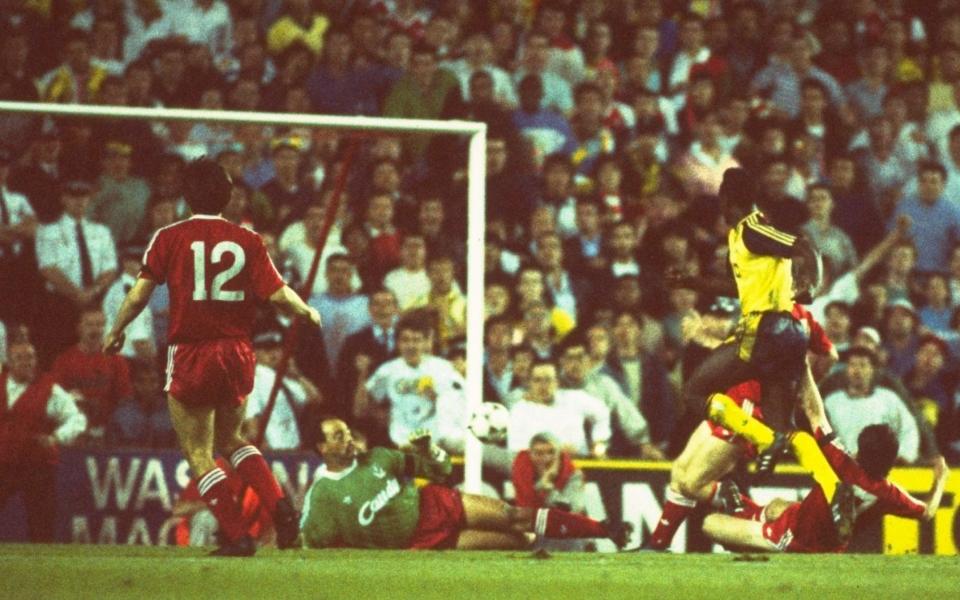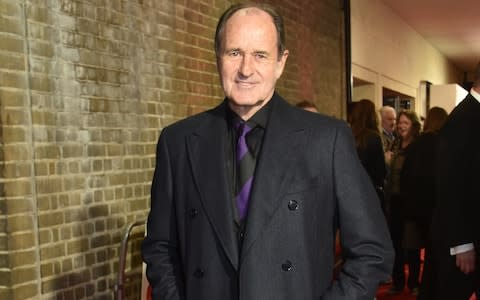George Graham: 'Spurs are a bit further ahead of Arsenal now'

It might be 22 years since George Graham left Arsenal but anyone doubting his enduring influence on each and every player he managed need only have been at the Odeon Cinema in Holloway last week. “George? Terrifying. Scared stiff of him,” says Lee Dixon. “Every so often you would think he was your mate but then you’d give the ball away and he would want to tear your head off. There’s still an aura. Put it this way. If he tells me to get him an ice-cream tonight, I’ll go and get him an ice-cream.”
Paul Merson then recalls how his old manager once dealt with him giggling during training. “He didn’t say a word but then the team went up and I never played for two months.” It was of course a very different era at Arsenal – captured beautifully in the new 89 film that chronicles how they dramatically clinched the 1988-89 league title in the final seconds of the season – and one that was indelibly shaped by Graham.
The stark contrast in managerial style to Arsene Wenger has only deepened a slightly rose-tinted nostalgia for the time but anyone questioning whether the modern Arsenal could benefit from a dollop of Graham-style resilience and discipline must have had their eyes shut for the past decade. Dixon tells me that you would have the “perfect” team if you could somehow combine his former managers, although he does pinpoint a pathological hatred of losing and utter certainty in their respective philosophy as shared traits.

Graham agrees. “I don’t want to knock Arsene,” he says. “I think Arsene has been not only great for Arsenal but English football. He believes in attacking, possession football. That’s his strength. His philosophy has never changed, and that is why there are a lot of fans very supportive of him and a few saying, the way the club is structured, they could and should be doing better. A lot of people are too critical in one department [but] in the other, you can say, ‘they have got a case’. It’s a matter of finding some balance. If you said to Tottenham and a lot of clubs, ‘You are going to finish in the top four and win the FA Cup’, I think they would say, ‘Thank-you very much’. When Arsenal are playing the way they can, they are still one of the best and most attractive teams. I just have a little bit of doubt when they haven’t got the ball and the opposition have.”
Graham then lets out a chuckle. “I’m trying to be nice,” he says, before explaining how, in practice, he used to organise his teams defensively. “Divide the width of the pitch with four players. Then, if we won possession, release one of the full-backs and divide the pitch by three rather than four.” Graham grimaces at the now common sight of two attacking full-backs simultaneously bombing forward. “I think, boy, they better have two good centre-halves to cover the width of the pitch. There are very few clubs in the Premier League who’ve got the balance right.”
Arsenal famously conceded only 18 goals in Graham’s other championship-winning season in 1990-91 (they have already let in 16 this season) but he says that there was one superior defensive team. “AC Milan. They were the only team who played offside better than us - sprinting up as a group. Fantastic!”
Now 72, and certainly mellowed in the 16 years since his career ended at Tottenham Hotspur, Graham will be back at The Emirates this lunchtime for one of the most eagerly awaited North London derbies of recent times. Never in Wenger’s tenure have Tottenham seemed so formidable and Arsenal so simultaneously vulnerable. Graham can see a power-shift, albeit with caveats.
“It all depends what day you see Arsenal,” he says. “I do think Tottenham are the best defensive team in the league. [Mauricio] Pochettino believes in the pressing game but you need players to buy into that. Most want to be on the ball, not trying to win it back. That’s the hardest thing to sell but you can see the players buy into how he wants to coach. Once you have that, you can get success. I think they have a few little problems. I think you need a stronger squad. Arsenal have been much the stronger over the last few decades but I see Tottenham level now and maybe a little bit further forward. It’s a young side so you think they can only get better.”
By contrast, Arsenal have the feel of a team nearing the end of a cycle and Graham believes that it would have been better simply to sell Alexis Sanchez if he wanted to join Manchester City. “If players don’t want to buy into what you are doing and want to move on - and you can tell day-to-day – then fair enough. It’s a win, win. You get a fabulous fee and you invest it in another player.”

Graham actually made that very call in selling Michael Thomas to Liverpool two years after scoring the goal that has now been immortalised on screen. It must have been strange to see your younger self starring in a film? “I look back now and I say, ‘Oh my god, was I so confident? I don’t believe this’,” says Graham. “It surprised me a little bit how positive I was.” Remarkably, Graham had told his players before kick-off that night at Anfield how the match would unfold. “Don’t concede, be cautious, 0-0 at half-time is perfect. Then we’ll open a bit, score and they’ll be nervous. We’ll win 2-0.” The rest is of course history but last week was also a reminder of the enduring chemistry within a group that was meticulously assembled by a manager who would devour local newspapers for insight into potential signings.
“If I was interested, I would see if I knew any of the coaches or players they had worked for. I wanted to find out about their ambition and attitude to training.” Graham was ahead of his time in the attention he paid to the character of new recruits and Dixon feels that, in retiring at 57 following subsequent jobs with Leeds United and Spurs, he finished “too early”. Yet having achieved the extraordinary feat of winning the league title, FA Cup, League Cup as well as a European trophy as both a player and manager, Graham appears genuinely content with the timing of his departure.
He has been struggling with rheumatoid arthritis but evidently loves his garden, golf and “the big games” on TV. “I enjoy watching you lot on the Sunday Supplement as well,” he says. “I think I did it the right way. I worked my way up and learnt from some great coaches like Terry Venables, Dave Sexton and Don Howe. Three years at Millwall was like nine years’ experience. I went up the ladder the right way and I wasn’t prepared to come back down, dropping clubs, standards and losing whatever reputation I had. If I was going to finish, it would be at the top. That’s the way I felt and I have never regretted it.”
89 is in OurScreen.com cinemas and on DVD and digital download this month

 Yahoo Sport
Yahoo Sport 





































